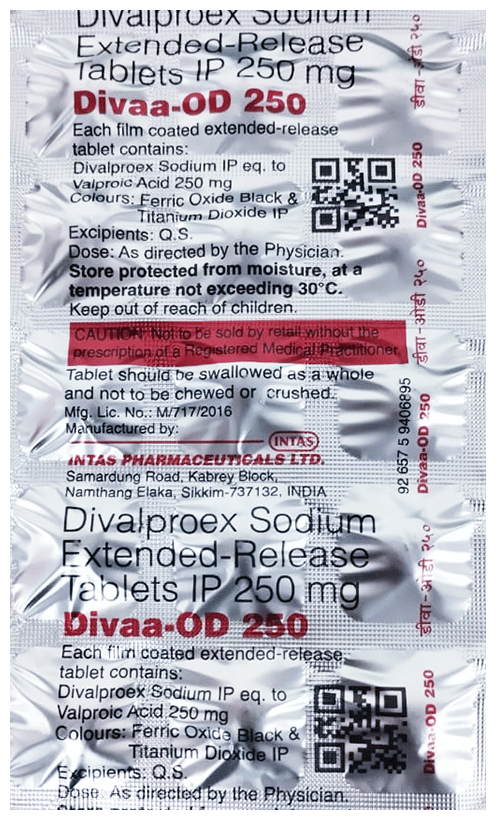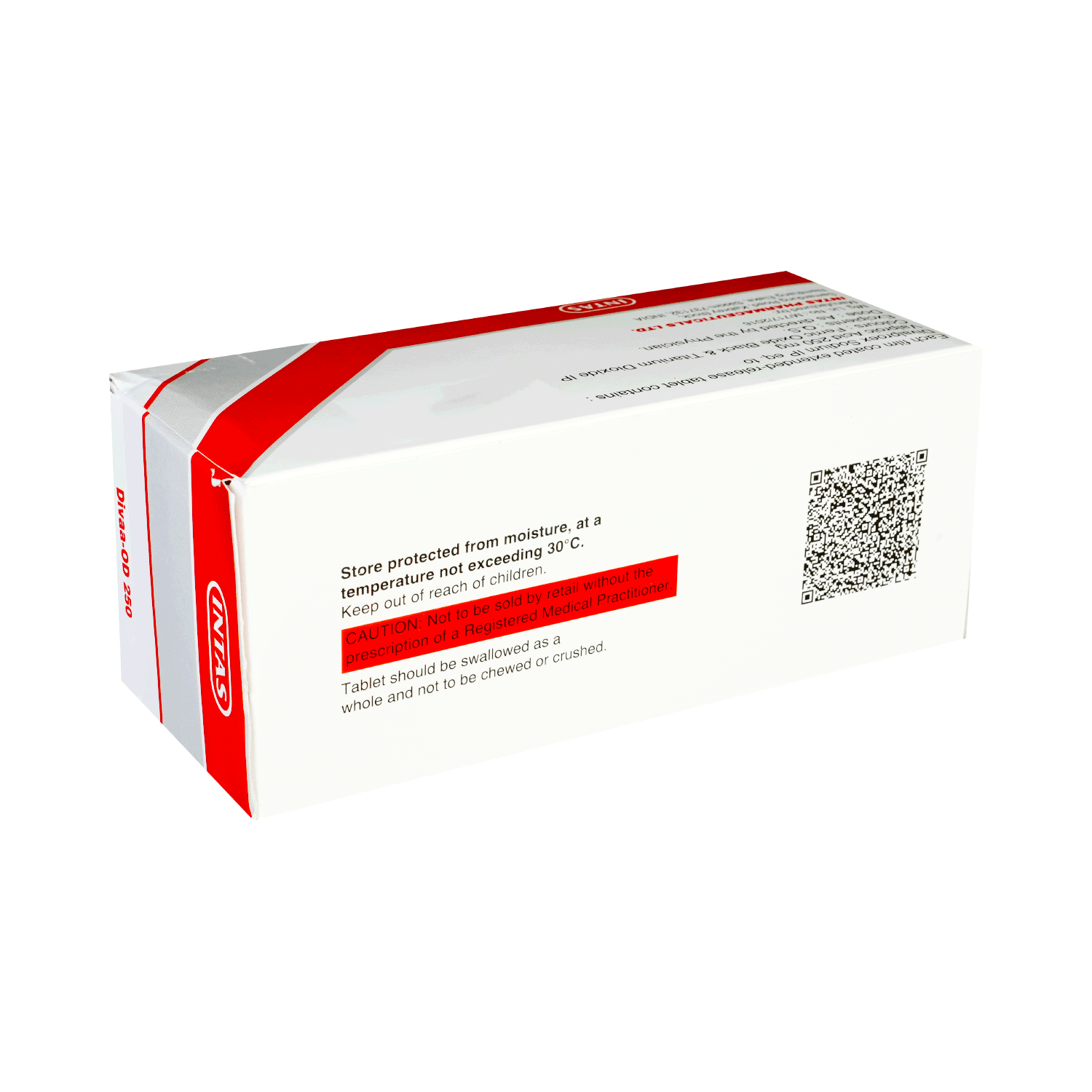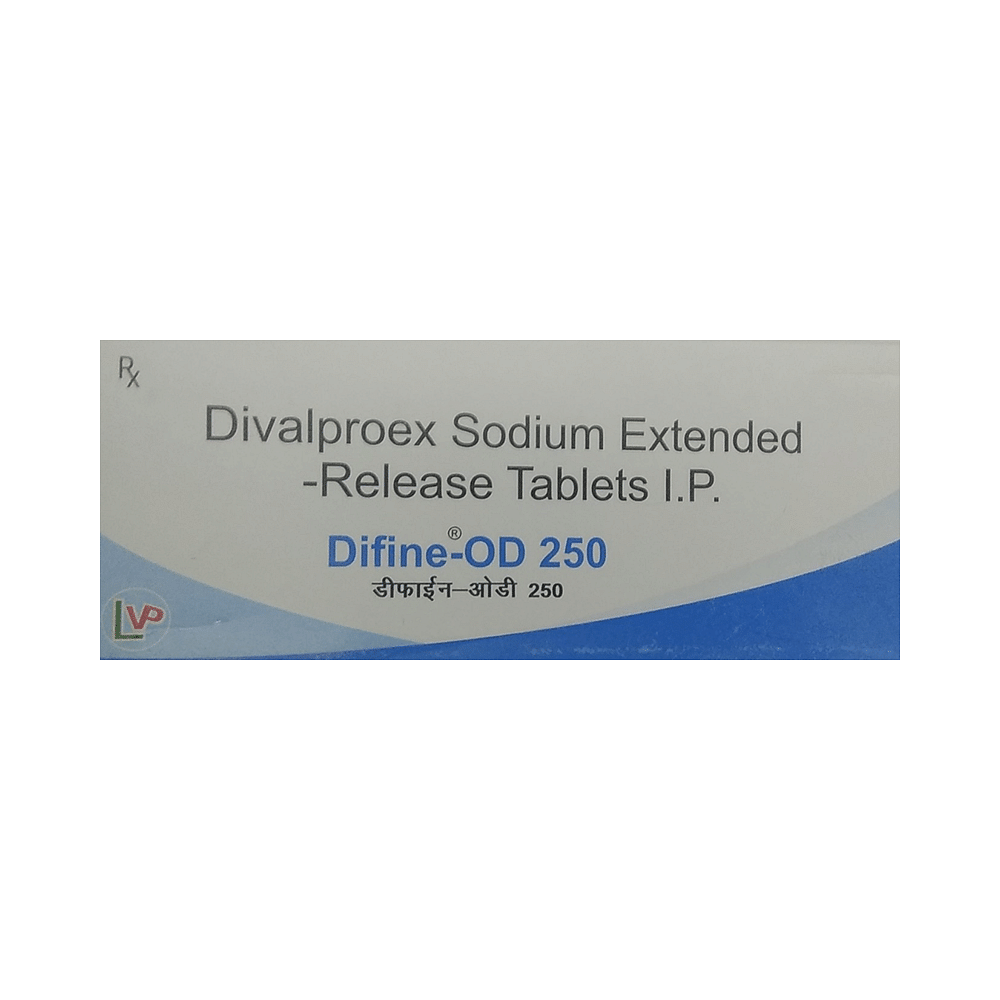
Dilavexx OD 250 Tablet ER
Manufacturer
Meracus Pharmaceuticals
Salt Composition
Divalproex (250mg)
Key Information
Short Description
Dilavexx OD 250 Tablet ER is a medicine used to treat epilepsy, prevent and control seizures (fits), and prevent migraines. It is also used to treat bipolar disorder.
Dosage Form
Tablet ER
Introduction
Dilavexx OD 250 Tablet ER may be used alone or in combination with other medicines. The dose and how often you need to take it will be decided by your doctor so that you get the right amount to control your symptoms. You can take this medicine with or without food but take it at the same time each day to get the most benefit. It usually takes a couple of weeks to work. It is important to take this medicine regularly and for as long as you are advised even if you feel well. Missing doses may trigger seizures and if you stop your condition may get worse. It should never be stopped suddenly.
Directions for Use
Take this medicine in the dose and duration as advised by your doctor. Swallow it as a whole. Do not chew, crush or break it. Dilavexx OD 250 Tablet ER may be taken with or without food but it is better to take it at a fixed time.
Safety Information
Side Effects
Headache Blurred vision Nausea Vomiting Dizziness Tiredness Unsteadiness Bruising Decreased body temperature
Alcohol Warning
Dilavexx OD 250 Tablet ER may cause excessive drowsiness with alcohol.
Breastfeeding Warning
Dilavexx OD 250 Tablet ER is safe to use during breastfeeding. Human studies suggest that the drug does not pass into the breastmilk in a significant amount and is not harmful to the baby.
Pregnancy Warning
Dilavexx OD 250 Tablet ER is unsafe to use during pregnancy as there is definite evidence of risk to the developing baby. However, the doctor may rarely prescribe it in some life-threatening situations if the benefits are more than the potential risks. Please consult your doctor.
Interacting Medicines
Alprazolam Chlordiazepoxide Clobazam Clonazepam
How it works
Dilavexx OD 250 Tablet ER is an antiepileptic medication. It controls seizures or fits by decreasing the abnormal and excessive activity of the nerve cells in the brain.
Quick Tips
Take your medication regularly as directed by your doctor as missing doses can trigger seizures. It can be taken with or without food but better to take with food to avoid stomach upset. Do not change the brand of your medicine and make sure that you have sufficient amount of medicine present with you. Practice yoga every day. Get enough sleep at nighttime. Limit the use of screen time such as mobile/laptop. Take your medication on time. Monitor your weight during treatment with this medicine as it can cause weight gain.
Related Medicines

Dicorate ER 250 Tablet

Divaa-OD 250 Tablet

Divaa-OD 250 Tablet

Dipoval 250mg Tablet ER

Difine-OD 250 Tablet ER

Divacon ER 250 Tablet

Md Prox 250mg Tablet ER

Divalcure XR 250 Tablet

Disadex-ER 250 Tablet

Dictate 250mg Tablet ER
Frequently asked questions
What happens if I stop taking Dilavexx OD 250 Tablet ER?
Do not discontinue Dilavexx OD 250 Tablet ER without consulting your doctor. Dosage should be gradually reduced and only stopped under medical supervision. Sudden discontinuation may lead to a recurrence of symptoms, including irritability, anxiety, dizziness, and tremors.
Is Dilavexx OD 250 Tablet ER a mood stabilizer?
Yes, Dilavexx OD 250 Tablet ER can sometimes be used as a mood stabilizer. It is prescribed for patients experiencing rapid mood fluctuations. The medication works by calming brain hyperactivity during these mood changes.
Can Dilavexx OD 250 Tablet ER cause weight gain?
Yes, Dilavexx OD 250 Tablet ER may lead to weight gain. This increase could be attributed to an increase in appetite. It is crucial to monitor your diet and exercise regularly to prevent any weight gain. Consult your doctor if you experience concerns about weight gain.
Does Dilavexx OD 250 Tablet ER make you sleepy?
Yes, Dilavexx OD 250 Tablet ER may induce drowsiness. Before driving or engaging in tasks requiring mental focus, be sure to consider the medication's effect on alertness.
Does Dilavexx OD 250 Tablet ER cause hair loss?
Yes, Dilavexx OD 250 Tablet ER can contribute to hair loss. However, this effect is temporary and generally dose-dependent. If the hair loss becomes bothersome or persists for a prolonged duration, it is advisable to consult your doctor.
Can Dilavexx OD 250 Tablet ER damage my liver?
Yes, Dilavexx OD 250 Tablet ER carries the potential to cause liver damage. The risk of liver injury is higher during the initial six months of treatment. Symptoms like nausea or vomiting, loss of appetite, stomach pain, dark urine, facial swelling, yellowing of skin or whites of eyes can indicate potential liver damage. Regular monitoring of liver function through blood tests is recommended, particularly in those at high-risk and those with pre-existing liver disease.
Can I drink alcohol while taking Dilavexx OD 250 Tablet ER?
Avoid consuming alcohol while on treatment with Dilavexx OD 250 Tablet ER. Alcohol consumption could exacerbate drowsiness, lightheadedness or dizziness.
What are the laboratory tests recommended before taking Dilavexx OD 250 Tablet ER?
Before starting treatment with Dilavexx OD 250 Tablet ER, your doctor may recommend blood tests. These may include: blood cell count (including platelet count), bleeding time, and coagulation tests. Periodic liver function testing is also recommended, particularly during the initial six months of therapy in those who are at risk or have a history of pre-existing liver disease.
What should be done if I start experiencing abdominal pain, nausea and anorexia?
If you experience sudden severe abdominal pain accompanied by nausea and vomiting, it could indicate pancreatitis. Consult your doctor immediately in case of these symptoms. Your doctor may perform a serum amylase test to confirm this diagnosis. If the test reveals elevated levels of amylase, discontinue medication immediately.
How to check for overdose of Dilavexx OD 250 Tablet ER?
Overdose of Dilavexx OD 250 Tablet ER may result in headache, blurred vision due to pupils becoming smaller, lack of reflexes, confusion, tiredness. You might also experience weak or floppy muscles, seizures (fits), loss of consciousness, behavioral changes, and breathing difficulties such as rapid breathing, shortness of breath, chest pain. If you suspect an overdose, seek immediate medical assistance.


